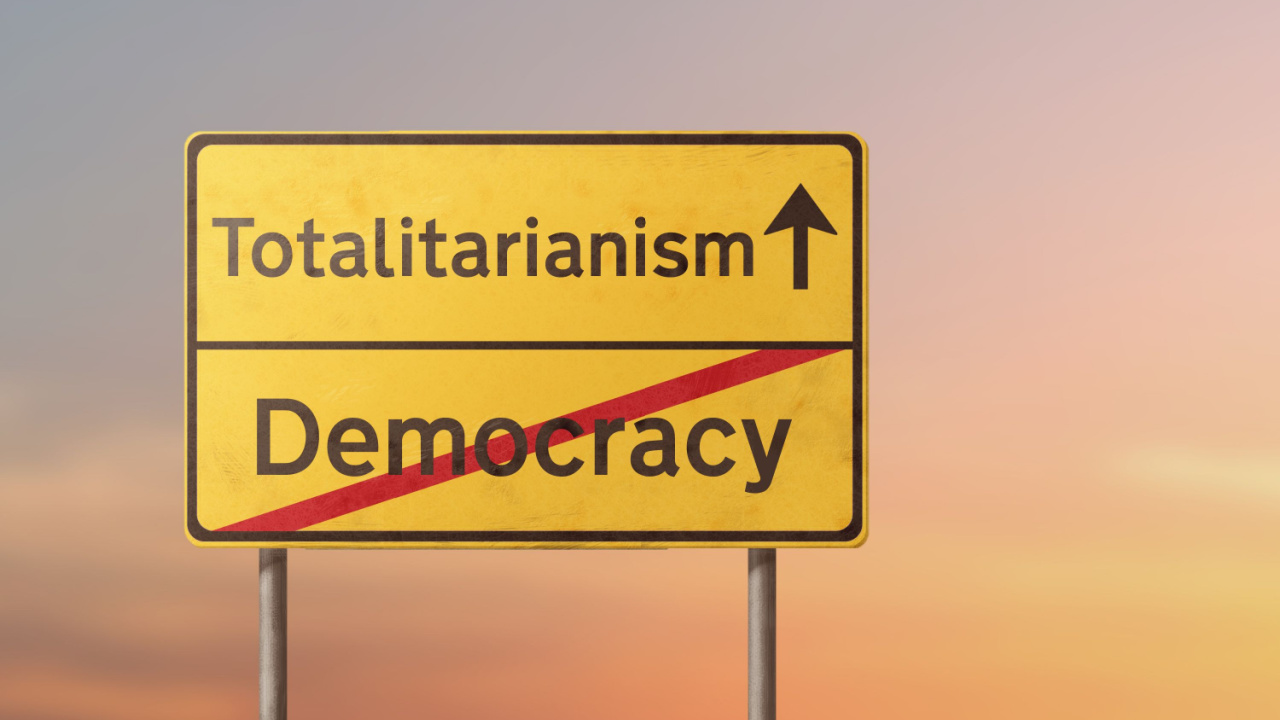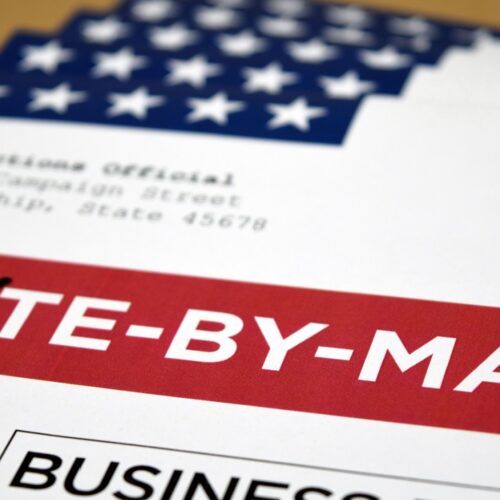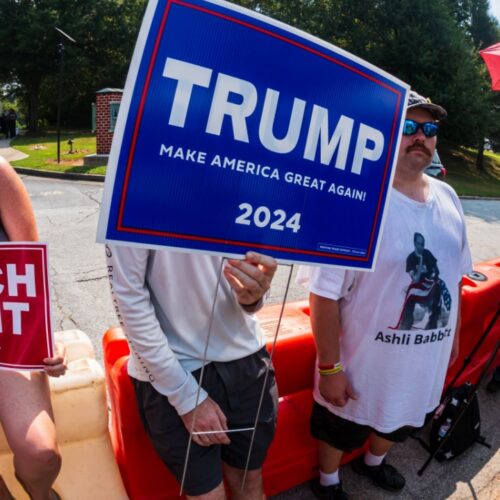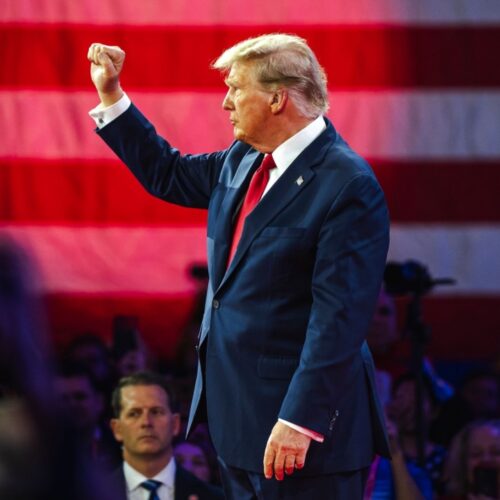America’s Woke Totalitarianism

Editor’s Note – Dr. Bradley C.S. Watson is a scholar of jurisprudence whose most celebrated work has addressed progressivism and its challenge to the American constitutional system. Until 2022, he held the Philip M. McKenna Chair in American and Western Political Thought at Saint Vincent College and served as co-director of the college’s Center for Political and Economic Thought (CPET). Watson resigned from Saint Vincent amid a brutal administrative crackdown over a guest speaker, Hillsdale College’s David Azerrad, who did not conform to institutionally approved messaging—joining, as Watson himself put it, a “long and depressing list of high-profile academic ‘cancellations.’”
Here, Dr. Watson responds to a 2022 essay by the Niskanen Center’s Gabriel Schoenfeld, which argued that many post-liberals’ description of American liberalism as “totalitarian” does not fit the accepted scholarly definition of the term. But how else should we describe a system under which Watson and countless others are persecuted for the slightest deviation from accepted ideology? And what should we make of a state that meets the legitimate grievances of its citizens not with reconciliation but with vindictive prosecution? Watson concludes that “Our glidepath toward totalitarianism should be obvious to all informed citizens”—even if the “willfully blind” will accept no evidence short of the Gulag.
In the spring of 2022, Gabriel Schoenfeld noted that “in one of those remarkable inversions of history, the charge that the United States is totalitarian no longer comes from the left but the right, from America’s growing contingent of self-proclaimed “post-liberal” intellectuals.” His piece is an indictment of the likes of Patrick Deneen, Rod Dreher, Yoram Hazony, Adrian Vermeule, and Sohrab Ahmari. I have my own disagreements with some of those writers, which are centered on their strained, ahistorical attempts to reduce America to a straw-man incarnation of the politics of John Locke, as well as their thinly veiled authoritarianism. But I would be loath to place them on the American right—they are certainly not “conservative” in any sense of the word. However, their thought overlaps with that of many patriotic Americans who are sympathetic to the framers’ Constitution, insofar as both camps identify totalizing tendencies in contemporary American liberalism.
Schoenfeld dismisses such concerns. He insists that “the contention that the United States is under totalitarian rule is simply false…There is no over-arching ideology to which it is mandatory to adhere. No single party dominates with an autocrat at its head. There is no government monopoly on communications or force. No secret police is hounding dissidents. No central economic planning is in place.” His argument in effect suggests there’s nothing wrong with America that dialing back certain strains of critical rhetoric can’t cure. Schoenfeld would simply have people move along, as if there’s nothing to see here. This head-in-the-sand complacency still characterizes the thought of many American conservatives. Far from being a solution, it’s a big part of our problem. While our regime is not yet totalitarian, it’s being nudged that way, and things are only getting worse.
Schoenfeld even goes so far as to claim that “in whatever direction one looks, the left-wing progressive agenda is in retreat.” Perhaps a personal anecdote will make clear why those words bring a smile to my face. At the time Schoenfeld was penning them, I was myself the target of a widely publicized academic cancellation at Saint Vincent College—for the crime of having invited an intellectually heterodox speaker to my campus. I suppose I can be thankful I wasn’t forced to read a public confession before my execution, but I wouldn’t bet the farm that my children will be free from such concerns should they refuse to mouth certain regime platitudes. The outlines of my case—a circling mob, craven institutional leaders, silence from friends—have been replicated across American academic and corporate entities so many times it’s pointless to recount individual examples. And I’m quite certain there are many more instances that we’ll never hear about because they’ve gone unnoticed by the national press—or were simply nipped in the bud by the early submission of men of feminine courage (as Hobbes would say) to the diktats of institutional apparatchiks. They are instances of behaviors that we might reasonably associate with totalitarian regimes. And they are things with which many on the American left used to be concerned. If it now falls to the “right” to call them out, so be it. All Americans of good will should join in the chorus.
Schoenfeld suggests the post-liberal theorists have more influence than they probably imagine. In his telling, they even helped set the table for the January 6 protests: “a climate has been created, and wild ideas are in circulation, which Trump exploited.” In reality, no group of intellectuals needed to create a “climate” in order to stoke genuine popular resentments against elites who pushed the nation into enormously destructive Covid lockdowns that disproportionately harmed the least well off in our society, used their newfound powers to change electoral rules on the fly, and went out of their way to praise or turn a blind eye to actual insurrectionists marching under the banners of Black Lives Matter and Antifa. By January 6, 2021, many Americans—who would hardly consider themselves post-liberals, and were nowhere near Washington, D.C. on that date—had good reason to be righteously indignant at these hallmarks of totalitarianism.
A healthy regime would attempt to respond to such legitimate grievances and quickly reassimilate the aggrieved, as America did in the wake of the Civil War (whose wounds are now being systematically reopened in a carefully orchestrated effort to upend liberal democratic norms and replace them with racially charged Maoist struggle sessions—which occur at all levels of society, from national institutions to corporate workshops). A totalitarian regime, by contrast, would legalistically pursue even non-violent protesters in an effort to destroy their lives and livelihoods, as it simultaneously proclaims them enemies of the people—of “our democracy.” Which is exactly what the national government has done.
And a healthy regime most certainly would not attempt to imprison and bankrupt a former chief executive through a smorgasbord of charges and allegations, most if not all of which are transparently trumped-up in an effort to deprive him of the opportunity to run for political office. And, more important still, they are seen as such by a large percentage of the population. Totalitarians are prone to overconfidence. It’s now even fair game to go after lawyers who have the temerity to offer legal advice disfavored by the regime.
Emboldened by the tyrannical impulses of so many of their ideological soulmates, state courts and low-level officials now move in lockstep in an attempt to keep the former president off their primary ballots. These efforts rests on the risible premise that the 14th Amendment is swallowed whole by highly idiosyncratic interpretations of state election codes—interpretations that assume contentious claims of fact and law without offering a full hearing to the aggrieved party, not to mention to the American voters. All of this amounts to a form of stick-in-the-eye, don’t-dare-try-anything-again politics that is a hallmark of totalitarian regimes. The deep-blue partisans who make such decisions in effect mock due process of law and challenge anyone to notice. And relatively few do. But for some critics, those few are too many—we should all go on pretending everything is fine. Long before the current crop of post-liberals burst onto the scene, Canadian political philosopher George Parkin Grant noted that “if tyranny is to come in North America, it will come cozily and on cat’s feet.”
Furthermore, our media “watchdogs,” and the chattering classes generally, now form a praetorian guard around an increasingly one-party state, which collectively applauds as the people seethe. While the government might not yet have a “monopoly on communications or force,” there certainly exists an oligopoly with respect to both. How else to account for the fact that in late October of 2020 dozens of high-ranking former intelligence officials, working with the current secretary of state in service of a political campaign, signed a letter suggesting that the scandalous and very real emails of the son of the current president were nothing more than a mirage, a Russian disinformation campaign? And that this was dutifully repeated, rather than reported, by lapdogs rather than watchdogs? And that Big Tech actively censored actual reporting on the matter?
According to a poll released just last month, a staggering 20 percent of voters who cast mail-in ballots (which accounted for 43 percent of all ballots in the 2020 election) admitted to engaging in one or more forms of voter fraud. Perhaps some diligent soul can count the number of times we’ve been told by our lapdog media that there was no evidence of any such thing. Or that merely to raise questions and demand election integrity is to be an enemy of “our democracy.” Whatever one might think of polling data on such politically charged matters, one stark reality remains clear: in the first election in which a majority of voters did not cast their ballots in person on election day, massive amounts of smoke only led our one-party elites to redouble their claims that merely to think there might be a fire is as inconceivable as it is unforgivable, and amounts to thoughtcrime of the first order.
Our glidepath toward totalitarianism should be obvious to all informed citizens. Shooting the messengers who notice it is something only the ignorant, the willfully blind, or the new totalitarians themselves would cheer on.
Bradley C. S. Watson teaches in the Van Andel Graduate School of Government at Hillsdale College in Washington, DC. He has authored or edited many books, including Progressivism: The Strange History of a Radical Idea (Notre Dame), Progressive Challenges to the American Constitution: A New Republic (Cambridge), and Living Constitution, Dying Faith: Progressivism and the New Science of Jurisprudence (ISI).



